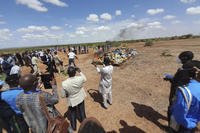Some of the National Guard’s roughly 40,000 technicians who were forced to take unpaid leave last week because of the government shutdown returned to work Monday, an official said.
The political gridlock in Washington, D.C., affected the vast majority of the Guard’s so-called dual-status technicians – uniformed employees who work alongside active-duty and reserve personnel at facilities across the country to maintain equipment and perform administrative duties.
Over the weekend, however, Defense Secretary Chuck Hagel ordered most of the Defense Department’s civilian employees back to work under a broad interpretation of the “Pay Our Military Act.” The legislation, signed into law hours before the shutdown took effect, guaranteed that basic pay and housing and food allowances for military personnel would continue.
“A majority of the civilians has returned to work under the Pay Our Military Act,” Maj. Jon Craig, a spokesman for the National Guard Bureau in Arlington, Va., said in a telephone interview. That includes military technicians, he said.
Exactly how many of the technicians reported to work is unclear, Craig said. It’s also unclear whether they’ll receive back pay for the missed workdays, he said. The Guard has almost 50,000 technicians, most of whom were furloughed last week after Congress failed to pass a budget for fiscal 2014, which began Oct. 1.
The Republican-controlled House has demanded that any legislation to temporarily fund the government include language to scale back President Obama’s signature health-care law, the 2010 Affordable Care Act, commonly known as Obamacare. The Democrat-controlled Senate and the White House have opposed any such provision, resulting in the impasse.
While the military’s 1.3 million active-duty troops and most of the Pentagon’s 800,000 civilian workers will receive paychecks during the partial government shutdown, many of the more than 800,000 Guardsmen and reservists won’t, unless they’re mobilized for a contingency or emergency. Some states such as Colorado and Texas have authorized funding for weather relief efforts, but most regular training has been suspended, according to Craig.
“Although this [legislation] returns some eligible civilians back to work full-time, there was nothing in the Act that freed up money for training or drilling at this time,” he said.
Along with calling most civilians back to work, Hagel also specified full time active-Guardsmen under Title 32 orders will be paid on time. Previously, Pentagon officials had said the legislation only protected the pay of Title 10 service members.
Reserve units have also suspended training, according to Lt. Col. Matthew Lawrence, chief of public information for the Army Reserve at Fort Bragg, N.C.
“We have no funds for training,” Lawrence said in a telephone interview. “We have no funds for travel. We have no funds for community-relations activities.
“All of those things are off the table for the moment,” he added. “We can’t pay our Army Reserve soldiers, so they can’t pull duty.”




























